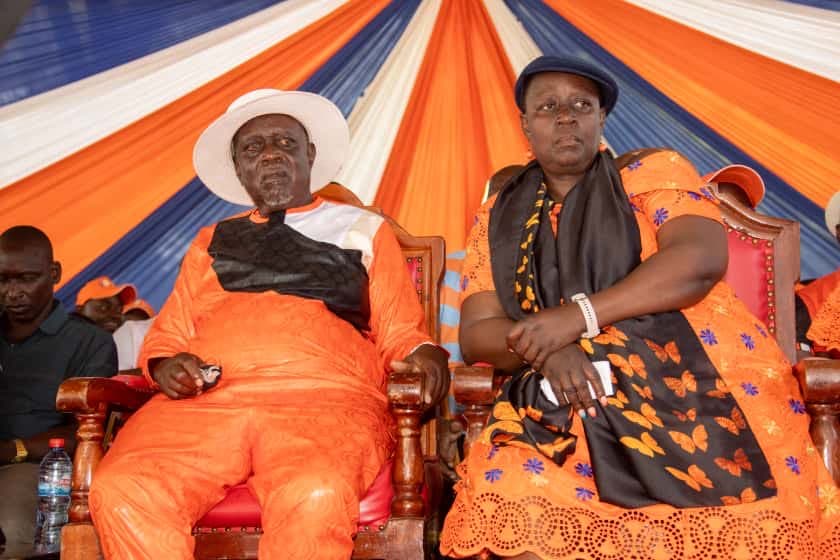We're loading the full news article for you. This includes the article content, images, author information, and related articles.
Siaya Senator Dr. Oburu Oginga has been installed as interim leader of the Orange Democratic Movement, inheriting a party grappling with ideological rifts and an uncertain future following the death of its iconic founder, Raila Odinga.

NAIROBI – The Orange Democratic Movement (ODM), one of Kenya's most formidable political forces for two decades, has entered a new and uncertain era under the stewardship of Dr. Oburu Oginga. The 82-year-old Siaya Senator and elder brother of the late Raila Odinga was appointed acting party leader by the National Executive Committee (NEC) and has since received endorsements from regional delegates, marking a pivotal moment for the party. The transition follows the death of Raila Odinga, who had been the undisputed leader of the party since its inception in 2005.
Dr. Oginga, a veteran politician with a career spanning over three decades, officially took the party's reins on Monday, October 27, 2025, by convening a Central Management Committee meeting at Orange House. The meeting's immediate agenda was to address the growing internal fissures that threaten to fragment the party ahead of the 2027 General Elections. His appointment is widely seen as a move to ensure leadership continuity during a critical transition period, though it requires ratification by the party's National Delegates Convention to be formalized.
Dr. Oginga inherits a party at a crossroads, deeply divided over its political direction. The central conflict revolves around whether to continue with the 'broad-based government' arrangement initiated by Raila Odinga in collaboration with President William Ruto's administration or to revert to its traditional role as a robust opposition force.
One faction, often described as 'conservatives' and appearing to include Dr. Oginga, Energy Cabinet Secretary Opiyo Wandayi, and others, advocates for upholding the late leader's final position of working within the government. They argue that this path honours Raila's legacy and ensures the community's development interests are represented. During a delegates' meeting in Bondo, leaders unanimously agreed to remain in the broad-based government, stating it was the last directive from their former leader.
Conversely, a vocal group of 'radicals', led by Secretary-General Edwin Sifuna and supported by younger parliamentarians, is staunchly opposed to any continued cooperation with the Ruto government. This faction insists that ODM must field its own presidential candidate in 2027 and maintain its identity as an opposition party to safeguard Kenya's pluralistic democracy. Political analyst Herman Manyora has suggested that Sifuna represents the future of the party and that embracing this generational shift is crucial for ODM's survival.
Dr. Oginga's immediate and most critical challenge is to bridge this ideological chasm. His leadership style, often characterized as low-key and pragmatic, will be tested as he navigates the competing interests of radicals, moderates, and conservatives within the restive political outfit. His supporters, including veteran Siaya Governor James Orengo, believe his experience and calm demeanor are assets that can stabilize the party. In his acceptance remarks following the Nyanza delegates' endorsement, Dr. Oginga promised to uphold Raila's vision and strengthen the party, stating, "I will not let you down."
Born on October 15, 1943, Oburu Oginga is an economist with a PhD from the People's Friendship University in Russia. His extensive political career includes serving as Member of Parliament for Bondo Constituency from 1994 to 2017, Assistant Minister for Finance in the Grand Coalition Government, and a representative at the East African Legislative Assembly (EALA) from 2017 to 2022, before his election as Siaya Senator. This long history in governance and legislation provides him with deep institutional knowledge, a quality his allies believe is essential for the party's current phase.
The direction ODM takes under Dr. Oginga will have profound implications for Kenyan politics. The party's decision on whether to remain allied with President Ruto or to re-establish itself as the primary opposition will significantly reshape political alliances leading up to 2027. President Ruto himself has weighed in, stating at Raila's funeral that he would "protect" ODM from being auctioned, a statement interpreted as an effort to maintain the current pact.
The internal power struggles also reflect a broader generational shift in Kenyan politics. The push by younger leaders like Sifuna for a more confrontational opposition role challenges the established order. How Dr. Oginga manages this dynamic—either by suppressing dissent or by fostering a new consensus—will determine whether ODM can retain its national character and its vast, loyal support base or risk fracturing into regional or ideological factions. As the party navigates life after its founder, its ability to unify and redefine its purpose will be a critical test of its resilience and Dr. Oginga's leadership.
Keep the conversation in one place—threads here stay linked to the story and in the forums.
Sign in to start a discussion
Start a conversation about this story and keep it linked here.
Other hot threads
E-sports and Gaming Community in Kenya
Active 9 months ago
The Role of Technology in Modern Agriculture (AgriTech)
Active 9 months ago
Popular Recreational Activities Across Counties
Active 9 months ago
Investing in Youth Sports Development Programs
Active 9 months ago
Key figures and persons of interest featured in this article